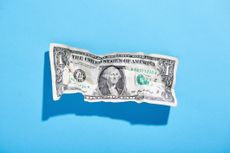Home Office Tax Deduction: Work-from-Home Write-Offs for 2023
Can you claim the home office tax deduction this year?


Like millions of people in the U.S., you may be fortunate to work from home. (Data show that the number of people working from home nearly tripled over the past few years). That may make you wonder whether you can claim a home office tax deduction on your federal income tax return. After all, you likely have some unreimbursed expenses. For example, you might pay for printer paper, ink, and other office supplies. Plus, your electric and utility bills are likely higher since you're home during the day.
But the reality is not every taxpayer can claim the home office deduction. Here's what you should know about the home office tax deduction before you file your 2023 tax return.
Home office tax deduction: Who qualifies?
Some people who work from home can deduct their business-related expenses, and there is also something called the "home office tax deduction" that lets you write off expenses for the business use of your home. However, whether you can claim those tax breaks depends on your employment status.

Sign up for Kiplinger’s Free E-Newsletters
Profit and prosper with the best of expert advice on investing, taxes, retirement, personal finance and more - straight to your e-mail.
Profit and prosper with the best of expert advice - straight to your e-mail.
Employees miss out. If you're a regular employee working from home, you can't deduct any of your related expenses on your tax return.
In the past, you could claim an itemized deduction for unreimbursed business expenses, including expenses for the business use of part of your home if they exceeded 2% of your adjusted gross income. However, that deduction was temporarily suspended. It's scheduled to go back into effect in 2026.
Home office tax deduction for self-employed people
Self-employed people can generally deduct office expenses on Schedule C (Form 1040) whether or not they work from home. This write-off covers office supplies, postage, computers, printers, and all the other ordinary and necessary things you need to run a home office.
The home office tax deduction is an often overlooked tax break for the self-employed that covers expenses for the business use of your home, including mortgage interest, rent, insurance, utilities, repairs, and depreciation.
It doesn't matter what type of home you have (e.g., single family, townhouse, apartment, condo, mobile home, or boat.) You can also claim the home office tax deduction if you worked in an outbuilding on your property, such as an unattached garage, studio, barn, or greenhouse.
Note: You cannot claim the home office tax deduction for any part of your home or property used exclusively as a hotel, motel, inn, or the like.
Claiming the home office tax deduction might lower your tax bill, but to qualify, you must use part of your home "regularly and exclusively" as your principal place of business. If you only work from home for part of the year, you can only claim the deduction for the period that you can satisfy the "regularly and exclusively" requirements.
"Regular use" means you use a specific area of your home (e.g., a room or other separately identifiable space) for business regularly. Incidental or occasional use of the space for business doesn't count.
"Exclusive use" means you use a specific area of your home only for your trade or business. The space doesn't have to be marked off by a permanent partition. You can't claim the home office deduction if you use the space for business and personal purposes. However, the exclusive use requirement might not apply if you use part of your home:
- For the storage of inventory or product samples; or
- As a daycare facility.
The space must also be used:
- As your principal place of business for your trade or business;
- To meet or deal with your patients, clients, or customers in the normal course of your trade or business; or
- In connection with your trade or business if it's a separate structure that's not attached to your home.
(See IRS Publication 587 for more information about these and other requirements for the home office deduction.)
How to calculate the home office deduction
If you qualify, there are two ways to calculate the home office deduction.
- Under the actual expense" method, you essentially multiply the expenses of operating your home by the percentage of your home devoted to business use. If you work from home for part of the year, only include expenses incurred during that time.
- Under the simplified method, you deduct $5 for every square foot of space in your home used for a qualified business purpose. Again, you can only claim the deduction for the time you work from home.
For example, if you have a 300-square-foot home office (the maximum size allowed for this method), and you work from home for three months (25% of the year), your deduction is $375 ((300 x $5) x 0.25).
Tax Tip: If you use the simplified method, you can't depreciate the part of your home used for business. However, to the extent you qualify, you can still claim itemized deductions for mortgage interest, real property taxes, and casualty losses for your home without allocating them between personal and business use.
The deduction is claimed on Line 30 of Schedule C (Form 1040). If you use your home for more than one business, file a separate Schedule C for each business. Don't combine your deductions for each business on a single Schedule C.
If you use the actual expense method to calculate the tax break, also complete Form 8829 and file it with the rest of your tax return. If you use more than one home for business, you can file a Form 8829 for each home or use the simplified method for one home and Form 8829 for others. Combine all amounts calculated using the simplified method and amounts calculated using Form 8829, and then enter the total on Line 30 of the Schedule C you file for the business.
Employees with a side business
If you're an employee at a "regular" job, but you also have your own side hustle, you can claim deductions for business expenses and the home office deduction for your own business — if you meet all the requirements. Being an employee doesn't mean you can't also claim the deductions you're entitled to as a self-employed person.
Related Content

To continue reading this article
please register for free
This is different from signing in to your print subscription
Why am I seeing this? Find out more here
Get Kiplinger Today newsletter — free
Profit and prosper with the best of Kiplinger's advice on investing, taxes, retirement, personal finance and much more. Delivered daily. Enter your email in the box and click Sign Me Up.
Rocky Mengle was a Senior Tax Editor for Kiplinger from October 2018 to January 2023 with more than 20 years of experience covering federal and state tax developments. Before coming to Kiplinger, Rocky worked for Wolters Kluwer Tax & Accounting, and Kleinrock Publishing, where he provided breaking news and guidance for CPAs, tax attorneys, and other tax professionals. He has also been quoted as an expert by USA Today, Forbes, U.S. News & World Report, Reuters, Accounting Today, and other media outlets. Rocky holds a law degree from the University of Connecticut and a B.A. in History from Salisbury University.
- Katelyn WashingtonFormer Tax Writer
-
 Amazon Prime Day vs Walmart Deal Days: Which Is Better?
Amazon Prime Day vs Walmart Deal Days: Which Is Better?From household goods and clothing to electronics and toys, which retail giant is the clear winner? The answer may be both.
By Kathryn Pomroy Published
-
 Perpetual-Life Non-Traded REITs: Four Things Investors Should Know
Perpetual-Life Non-Traded REITs: Four Things Investors Should KnowCompanies with good track records oversee the largest perpetual-life non-traded REITs, but there are some structural concerns about the funds to be aware of.
By Matt Sharp Published
-
 The Taxes That Come out of Your Paycheck
The Taxes That Come out of Your PaycheckPayroll Tax Your take-home pay is often less than expected due to several payroll tax withholdings you need to know.
By Kelley R. Taylor Last updated
-
 Seven States Where Gas Tax Increased July 1
Seven States Where Gas Tax Increased July 1Gas Taxes Since July has arrived, drivers in several states are facing a gas tax hike.
By Kelley R. Taylor Last updated
-
401(k) Withdrawal Penalty Rule Changes for 2024
Tax Rules More people are taking early emergency withdrawals from retirement savings accounts. New rules might offer some relief.
By Kelley R. Taylor Last updated
-
 Summer Activities That Can Impact Your Taxes
Summer Activities That Can Impact Your TaxesTax Planning Certain summertime activities might help lower your taxable income.
By Kelley R. Taylor Last updated
-
HSA Contribution Limit Rising Again for 2025
Health Savings Contribution limits matter when it comes to maximizing your tax-advantaged health savings account.
By Kelley R. Taylor Last updated
-
Three IRS Tax Deadlines for June 17
Tax Deadlines There are some important June IRS tax deadlines you shouldn’t overlook.
By Kelley R. Taylor Last updated
-
New Colorado Tax Credit Offers Two Years Free College: What to Know
Tax Credits Thanks to a new tax credit, some Coloradans will soon have access to two years of free college tuition.
By Kelley R. Taylor Published
-
Roth 401(k) Changes: What You Should Know for 2024
Retirement Savings Key changes to Roth 401(k) account rules may affect your tax planning and retirement savings.
By Kelley R. Taylor Last updated




